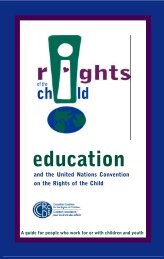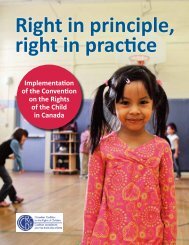Poste - Canadian Coalition for the Rights of Children
Poste - Canadian Coalition for the Rights of Children
Poste - Canadian Coalition for the Rights of Children
Create successful ePaper yourself
Turn your PDF publications into a flip-book with our unique Google optimized e-Paper software.
C A N A D I A N C O A L I T I O N F O R T H E R I G H T S O F C H I L D R E N<br />
privately-sponsored refugees where <strong>the</strong> sponsorship<br />
agreement has broken down and has made available<br />
additional funds to assist refugees with special needs. 109<br />
Loans are also made available <strong>for</strong> some refugees to cover<br />
<strong>the</strong> costs <strong>of</strong> medical examinations required to establish a<br />
person’s admissibility, travel costs to Canada, costs<br />
related to finding accommodation and gaining<br />
employment, as well as <strong>the</strong> right-<strong>of</strong>- landing fee. Since<br />
February 1995, all loans are subject to interest<br />
provisions, although Convention refugees and members<br />
<strong>of</strong> a designated class selected abroad are eligible <strong>for</strong><br />
interest deferral <strong>for</strong> up to three years. A refugee applying<br />
<strong>for</strong> an immigrant loan must demonstrate <strong>the</strong> need <strong>for</strong> <strong>the</strong><br />
loan and <strong>the</strong> ability or potential ability to repay it.<br />
For refugees in Canada who are not sponsored, financial<br />
assistance is available through provincial and territorial<br />
social assistance programs. Eligibility criteria <strong>for</strong><br />
provincial social assistance varies across <strong>the</strong> country.<br />
Since November 1996, refugee claimants in Quebec<br />
receiving welfare assistance are only eligible <strong>for</strong> <strong>the</strong> base<br />
amount and no longer have access to employability<br />
measures. Although parents are eligible <strong>for</strong> work permits,<br />
<strong>the</strong>y <strong>of</strong>ten have difficulty working, and <strong>the</strong> situation has<br />
worsened over <strong>the</strong> past three years, with families turning<br />
to anti-poverty groups <strong>for</strong> help. 110 These families are<br />
ineligible <strong>for</strong> emergency social assistance according to<br />
section 7 <strong>of</strong> <strong>the</strong> Loi de la sécurité du revenu. However, a<br />
recent decision by <strong>the</strong> Ministère des relations avec les<br />
citoyens et de l’immigration provides free financial<br />
assistance once <strong>the</strong> Quebec identification papers have<br />
been issued. (These papers give <strong>the</strong> holder access to<br />
Government <strong>of</strong> Quebec services such as education and<br />
French language training, until a final decision is made<br />
regarding <strong>the</strong> holder’s status.) These documents are<br />
issued within 48 hours <strong>of</strong> <strong>the</strong> claimant providing a<br />
resident address.<br />
Settlement Services<br />
A project recognized as a priority <strong>for</strong> <strong>the</strong> <strong>Canadian</strong><br />
Council <strong>for</strong> Refugees is developing national standards<br />
<strong>for</strong> settlement services. According to <strong>the</strong> 1998 nongovernmental<br />
report, Best Settlement Practices, “national<br />
standards would be a tool to ensure that newcomers could<br />
be guaranteed certain minimum levels <strong>of</strong> services<br />
wherever <strong>the</strong>y settled in Canada.” This report also called<br />
<strong>for</strong> a “national clearing house <strong>for</strong> in<strong>for</strong>mation on<br />
settlement services.” 111<br />
114<br />
Settlement services in Canada are primarily delivered by<br />
non-pr<strong>of</strong>it, non-governmental organizations located in<br />
communities across <strong>the</strong> country. Funding is provided to<br />
many <strong>of</strong> <strong>the</strong>se organizations through <strong>the</strong> federal<br />
Immigrant Settlement and Adaptation Program (ISAP).<br />
O<strong>the</strong>r sources <strong>of</strong> funding include provincial and<br />
municipal governments, fundraising and donations.<br />
In Quebec, settlement services are provided by <strong>the</strong><br />
Ministère des relations avec les citoyens et de<br />
l’immigration through a network <strong>of</strong> seven regional<br />
<strong>of</strong>fices located in Montreal, Laval, Laurentides-<br />
Lanaudière, Montérégie, Estrie, Outaouais and Quebec<br />
City. The Quebec government depends on community<br />
organizations to deliver a variety <strong>of</strong> services such as<br />
orientation programs, French language instruction,<br />
assistance with employment and housing searches. These<br />
non-governmental organizations play a very important<br />
role in <strong>the</strong> delivery <strong>of</strong> services <strong>for</strong> refugees and are <strong>of</strong>ten<br />
reluctant to obtain government funding in order to<br />
maintain autonomy and ensure <strong>the</strong> protection <strong>of</strong> refugees<br />
and refugee claimants. 112<br />
The hundreds <strong>of</strong> agencies and organizations across<br />
Canada that provide settlement services <strong>for</strong> refugees and<br />
immigrants vary, depending on <strong>the</strong>ir size, location and<br />
mandate. For example, COSTI, <strong>the</strong> largest immigrantserving<br />
group in Toronto, is a multicultural agency that<br />
works with all immigrant communities in Greater<br />
Toronto. Its services include: orientation, in<strong>for</strong>mation,<br />
referrals, settlement services, counselling, English as a<br />
second language classes, citizenship preparation,<br />
programs <strong>for</strong> women (including social, economic and<br />
cultural issues), programs <strong>for</strong> seniors, vocational and<br />
placement services (including career counselling, training<br />
and placement), rehabilitation services (to assist people<br />
with disabilities to re-enter <strong>the</strong> work<strong>for</strong>ce), family<br />
counselling, post-settlement support, advocacy and<br />
public education. COSTI has a diverse clientele <strong>of</strong> 20,000<br />
annually and a staff <strong>of</strong> over 130 who, toge<strong>the</strong>r, speak<br />
more than 30 languages.<br />
The Joint Centre <strong>of</strong> Excellence <strong>for</strong> Research on<br />
Immigration and Settlement--Toronto says that “<strong>the</strong><br />
resettlement needs <strong>of</strong> persons admitted to Canada under<br />
refugee status require more attention than <strong>the</strong>y have<br />
hereto<strong>for</strong>e received. Although resources may be available<br />
to help refugees during <strong>the</strong> first year after arrival, <strong>the</strong><br />
period <strong>of</strong> adjustment is far more protracted.” 113 The<br />
Ontario Council <strong>of</strong> Agencies Serving Immigrants is




